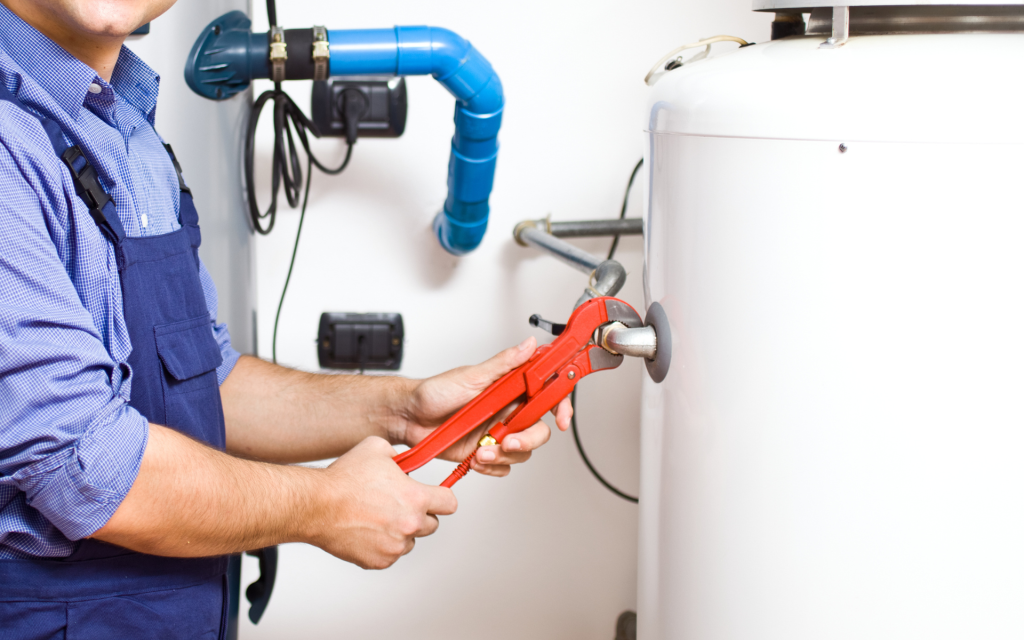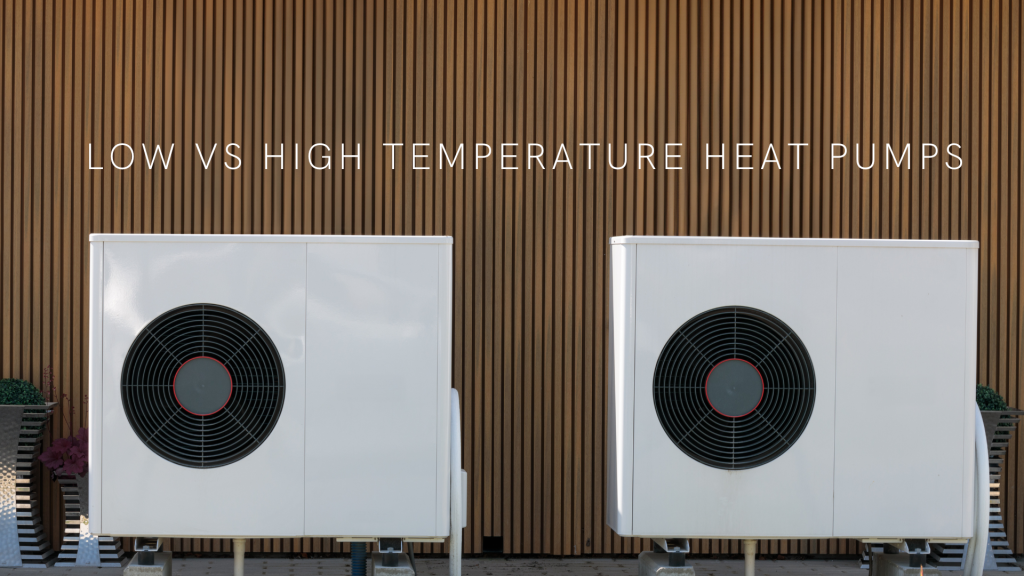Table of contents
Summary
Heat pump water heaters and heat batteries both deliver low-carbon hot water, but they work in very different ways. A heat pump water heater is a large cylinder with a built-in heat pump that heats and stores water. A Sunamp Thermino stores heat in a compact phase-change material and delivers mains pressure hot water on demand.
For installers and specifiers, the choice often comes down to space, installation complexity, compliance and cost. Heat pump water heaters typically cost £8,750 to £12,500 installed, while a Thermino 12 kWh unit (around 300L cylinder-equivalent) comes in at about £4,300 installed cost for a Thermino xPlus 300. The Eco Experts also estimate heat pump water heaters cut annual running costs to around £139 per year, compared to £418 for a standard electric cylinder.
Thermino can achieve similar savings by shifting charging to low-cost tariffs or solar PV, with the added benefit of being up to four times smaller than a cylinder, G3-exempt and compatible with today’s high-temperature heat pumps via Optimino technology. Crucially, Thermino qualifies as ancillary equipment under the Boiler Upgrade Scheme, so it can be funded alongside an MCS-installed heat pump.
Why this comparison matters in 2025
Most UK homes still rely on gas for heat and hot water. USwitch’s statistics show that 80% of UK households have a combi boiler – meaning around 23 million households in the UK heat water “on demand” with no cylinder.
So, there’s the challenge when specifying a heat pump: many homes will need hot water storage for the first time.
From 2025, the Future Homes Standard will require low-carbon heating in all newbuilds. Deployment is already accelerating: MCS Certified reports a record 220,500 renewable energy systems installed in 2024, including 98,469 hydronic heat pumps – the highest ever annual figure. Almost 60,000 of these were MCS-certified domestic installs. The government still targets 600,000 installs per year by 2028.
As combis are swapped out at scale, the practical decision is whether to specify a heat pump water heater or a compact thermal store like Thermino.
What is a heat pump water heater?
Heat pump water heaters (HPWHs) are specifically designed for domestic hot water, unlike conventional heat pumps that primarily serve space heating. They work by transferring heat from the surrounding air into a tank of water via a small compressor. Instead of generating heat directly, they move it – making them two to three times more efficient than gas boilers and three to four times more efficient than direct electric heaters.
Heat pump water heater costs in the UK
The average cost of a HPWH in the UK is between £5075 and £8300, depending on the model and capacity. A typical 1-bed home may need a 120L unit (around £5000), while a 3-bed family home will often require 180 litres, costing closer to £8300. Larger capacities (200-250 L+) go even higher, and once you add installation and site complexity, Checkatrade reports installed prices of £8750 to £12500.
Running costs and efficiency
Operating at around 300–400% efficiency (COP 3–4), HPWHs deliver significant savings compared to direct-electric storage. The Eco Experts calculate an average UK home spends £139 per year to run a HPWH, vs £418 for a conventional electric water heater, saving nearly £280 annually.
Advantages of heat pump water heaters
- High efficiency: Up to four times more efficient than electric immersion heaters.
- Lower running costs: Substantially cheaper to operate than ‘electric-only’ water heating.
- Reduced carbon footprint: Electricity use is offset by efficiency, cutting emissions compared to gas.
- Proven technology: Familiar to installers in other regions (North America, Europe) and increasingly present in UK homes.
Disadvantages of heat pump water heaters
- Space requirements: Like traditional hot water cylinders, HPWHs are large, typically 200–300 litres, and need clearance and airflow, making them unsuitable for many smaller homes and flats.
- Noise and siting: Units contain a compressor, often compared to a fridge, which may be disruptive in compact residential homes.
- Compliance and maintenance: Because they store pressurised hot water, HPWHs require G3 certification for installation. Legionella/Limescale maintenance and and ongoing servicing.
- Performance variation: Efficiency depends on ambient air temperature; colder temperatures conditions can have an impact on COP. Also, compared to an instant water heating of a combi, they’re slower to heat water, which could be a serious challenge for residents choosing to move away from fossil fuels to low-carbon heating options.
More about Sunamp Thermino heat battery
A Sunamp Thermino heat battery stores thermal energy in a salt-based phase change material and transfers it instantly to mains water through a high-power heat exchanger. Only a tiny internal loop (<15 litres) holds water, making the design inherently Legionella-safe and exempt from G3 certification.
Because our Plentigrade PCM stores heat much more densely than water, a Thermino is up to four times smaller than an equivalent heat pump hot water cylinder. The Thermino xPlus heat batteries are available in sizes equivalent to 150L, 210L and 300L of hot water, making them suitable for anything from small flats to family homes.
Installation is quick and easy: no discharge pipework, no annual G3 servicing, and units can often be fitted in under a day. Once installed, the appliances are maintenance-free, only the external components need regular maintenance.
Heat pump water heater vs Sunamp Thermino cost comparison in the UK (2024–2025 market)
Heat pump water heater (HPWH)
Typical supply-and-install ranges are £5,075 to £8,300 depending on size and brand (based on GreenMatch’s findings). For larger homes or split-system models, Checkatrade reports installed prices of £8,750 to £12,500.
Thermino heat battery
A Thermino 12 kWh unit (around a 300-litre cylinder equivalent) has an MRRP near £3,400, with typical installed pricing around £4,300. That is roughly £320 per kWh of storage. We’ve covered this in detail our other blog article: heat battery vs electric battery comparison.
What that means
In terms of like comparison, an installed Thermino heat battery lands below a comparable HPWH on upfront cost while also freeing up significant space and higher energy efficiency.
Running costs and efficiency
Heat pump water heater
HPWHs reduce electricity use by extracting heat from air. Independent testing and guidance place typical efficiency around 300–400% (COP is ~3-4). The Eco Experts calculate that an average UK home spends about £139 a year on HPWH hot water, compared with £418 for direct electric, a saving of nearly £280 annually.
Thermino heat battery
Thermino achieves similar or lower running costs differently. It allows households to charge when energy is cheapest or greenest and then deliver hot water instantly with very low standing losses (up to 4x lower than a traditional cylinder). In practice, that means charging from a high-temperature heat pump to keep the COP advantage, and/or using off-peak electricity or solar PV to minimise cost.
The takeaway
HPWHs lower bills via inherent COP gains. Thermino heat battery lowers bills by pairing with heat pumps and by time-shifting charging to off-peak or solar, while avoiding the space issues, heat loss and compliance overheads of big hot water storage cylinders.
Integration with high-temperature heat pumps
One limitation of low-temperature heat pumps is that they struggle to raise water above 55 °C without immersion top-ups, which is often an issue when retrofitting in older flats with small radiators and poor insulation. Modern high-temperature heat pump models using R290 refrigerant can deliver 65–75C, and address these constraints. Thanks to the Optimino technology, Thermino is designed to pair with most leading high-temperature heat pump brands.
Grants and compliance
The Boiler Upgrade Scheme (BUS) provides up to £7500 toward MCS-installed heat pumps in England and Wales. Ofgem guidance confirms the grant covers not only the heat pump but also ancillary equipment such as hot water cylinders and buffer tanks. A Thermino, performing the same role in a system, is treated as ancillary equipment, so it can be BUS-funded alongside a heat pump.
Conclusion
Both heat pump water heaters and Sunamp Thermino heat batteries offer a clear pathway to low-carbon hot water. HPWHs deliver efficiency through integrated heat pumps, but they require significant space and compliance measures.
Thermino achieves the same outcome with a smaller footprint, lower installation cost, fewer compliance headaches, and broad compatibility with today’s heat pumps. As combi boilers are phased out and heat pumps scale rapidly, compact thermal storage offers a practical way to meet homeowner expectations while making life easier for installers and specifiers.
For 2025 and beyond, Thermino represents a compact, future-proof choice for reliable domestic hot water in the transition to low-carbon heating. If you’re specifying for low-carbon housing project, click here to get in touch with us.



